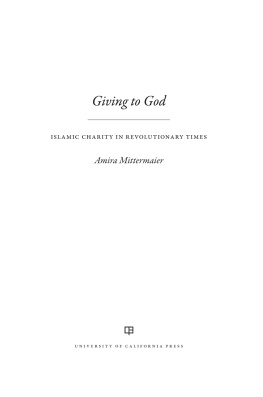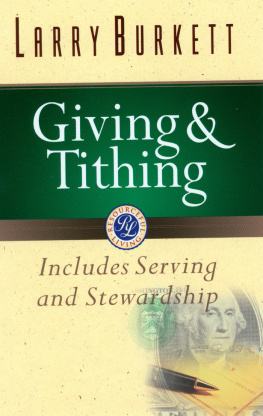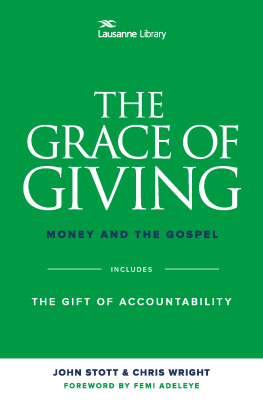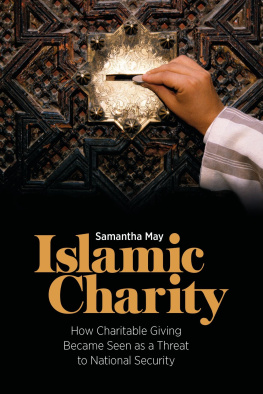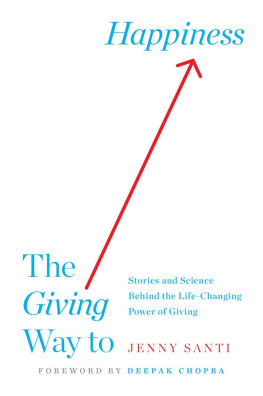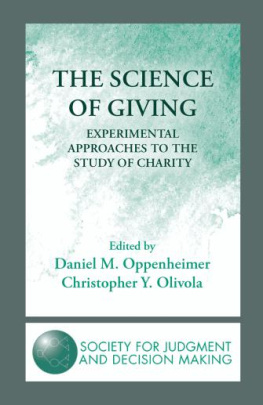When transliterating from Arabic texts, I have largely adopted the system outlined in the International Journal of Middle East Studies. I use long vowel marks, and mark the ayn () and hamza (), but I omit the dots. When transcribing from Egyptian colloquial Arabic, I modified the IJMES system slightly to convey a sense of colloquial speech, partly borrowing from the Dictionary of Egyptian Arabic by el-Said Badawi and Martin Hinds (1986). I do not mark long vowels in transliterated names, and the names of some well-known personalities, place-names, and terms with common English spellings, such as Quran, are preserved as such.
Unless otherwise noted, all translations from Arabic are my own. For Quranic verses, I generally use Muhammad Asads translations. Plurals of Arabic words are in most cases indicated by adding an s to the singular form, such as shaykhs. All dates follow the Common Era. For the sake of privacy, I have changed the names of interlocutors except for those who wanted to be named.
ACKNOWLEDGMENTS
This book tells a story about giving and so it is inevitably also about receiving. Alongside recipients who diligently perform their suffering and gratitude, we will meet others who purposefully do not thank the donor, who simply take and walk away. I spent much time in Egypt thinking about gratitude, its virtues and limits. I was, and continue to be, impressed by economies of giving that are organized around the idea of a rightful share. But I was raised in Germany, in a culture suffused with bitte and danke. Now, living in Canada, I say please and thank you even more often, and I teach my three-year-old to do the same. With these rules of politeness ingrained in my very way of being, I cannot but begin with a familiar gesture of gratitude: the obligatory acknowledgments.
Many of the people with whom I spent my days in Cairo are not merely interlocutors but have become friends over the years. My friendship with Madame Salwa has withstood more than the geographical distance. I first met her at Ibn Sirins shrine about fifteen years ago; she turned out to be not only a gifted dreamer but also a committed giver. Her mark on this book is pervasive. Shaykh Salah and the woman I call Nura welcomed me into their khidmas, patiently put up with my questions, and enacted the very hospitality that they talk about abstractly and embrace spiritually. I learned far more from them than I could ever convey in writing. At Nuras khidma I also often saw the dervish Shaykh Mahmoud; I regret that it took me so long to realize how much I learned from him too. The charity organization Resala was a very different kind of space, but it, too, welcomed me in; dozens of volunteers shared their life stories, dreams, and frustrations with me and took me under their wings as we marched through the slums. Dr. Sherif Abdelazeem, the organizations founder and its current chairman, generously agreed to multiple interviews despite his busy schedule, and invited me to various Resala events. Trying to grasp even more bureaucratized forms of Islamic charity, I spent countless days at the Mustafa Mahmoud Association and am grateful to its employees, who shared their work space, tea, gossip, and boredom with me. As in previous years, Ramadan was marked for me by late nights with al-Ashraf al-Mahdiyya, followers of the late Shaykh Salah al-Din al-Qusi, who host a large Ramadan table ( midat al-rahmn ) throughout the month of fasting. I keenly appreciate the ways this community has taken me in. Special thanks to Umar El-Gendy, who spoke to me with as much passion about the spiritual merits of serving food as he did about the promises and pitfalls of the revolution. To the woman I call Amal: thank you for the many strolls and conversations, and for bringing me back to peoples real material struggles at times when I was at risk of getting carried away by the beauty of an Islamic ethics of giving.
I am grateful to the self-declared revolutionaries who showed me around Tahrir Square and indulged my questions about things that were sometimes deeply important and sometimes utterly irrelevant to them, as well as to those who sat down for extensive interviews with Mariam later on, at a time when remembering could be painful. More fundamentally, I thank all of Egypts revolutionaries, who opened up a space of hope for so many of us, a space still reverberating despite the oppressive atmosphere, and currently merging, I believe, into entirely new spaces that have little to do with politics narrowly defined. Unexpected openings, unexpected conversations.
I was truly blessed with the research assistants I had in Cairo. Hassan Surour was more friend and mentor than assistant. I dont know anyone who is able to move as gracefully across Egypts starkly different social worlds. Hassan also brought on board two additional research assistants: Hana El-Rakhawi, who, through her meticulous fieldwork and photographs, helped me get a better grasp of a broader landscape of khidmas and Ramadan tables; and Mariam Abou Ghazi, who did countless interviews, patiently indulged my desire to put charity and revolution into conversation, and is now already thinking with me about my next project. I would also like to thank Mahmoud Bayomi for carefully sorting through media sources; Ahmed Sarhan for tracking political discourses related to social justice; Karim Khashaba for transcribing interviews; and Hana El-Rakhawi, Inger Marie Vennize, Yomna Magdi, and Hager El Hadidi for allowing me to use their photographs.
Generous research funding was provided by the Wenner-Gren Foundation for Anthropological Research and the Social Sciences and Humanities Research Council of Canada. A Chancellor Jackman Research Fellowship gave me a break from teaching, a vibrant interdisciplinary community, and the necessary headspace to sort through my materials. My home departments, toothe Department for the Study of Religion and the Department of Anthropology at the University of Torontohave been wonderfully stimulating environments for thinking and writing. Special thanks to John Kloppenborg, my Department Chair at the time, who agreed to give me a semester off when I was itching to get back to Egypt in 2011. Research assistance in Toronto was provided by Ayah al-Oballi, Hadear Shaheen, Khalidah Ali, Mourad Laabdi, and Dylan Shaul. To all of them I am grateful for their intellectual labor, their meticulousness, and also their humor.

